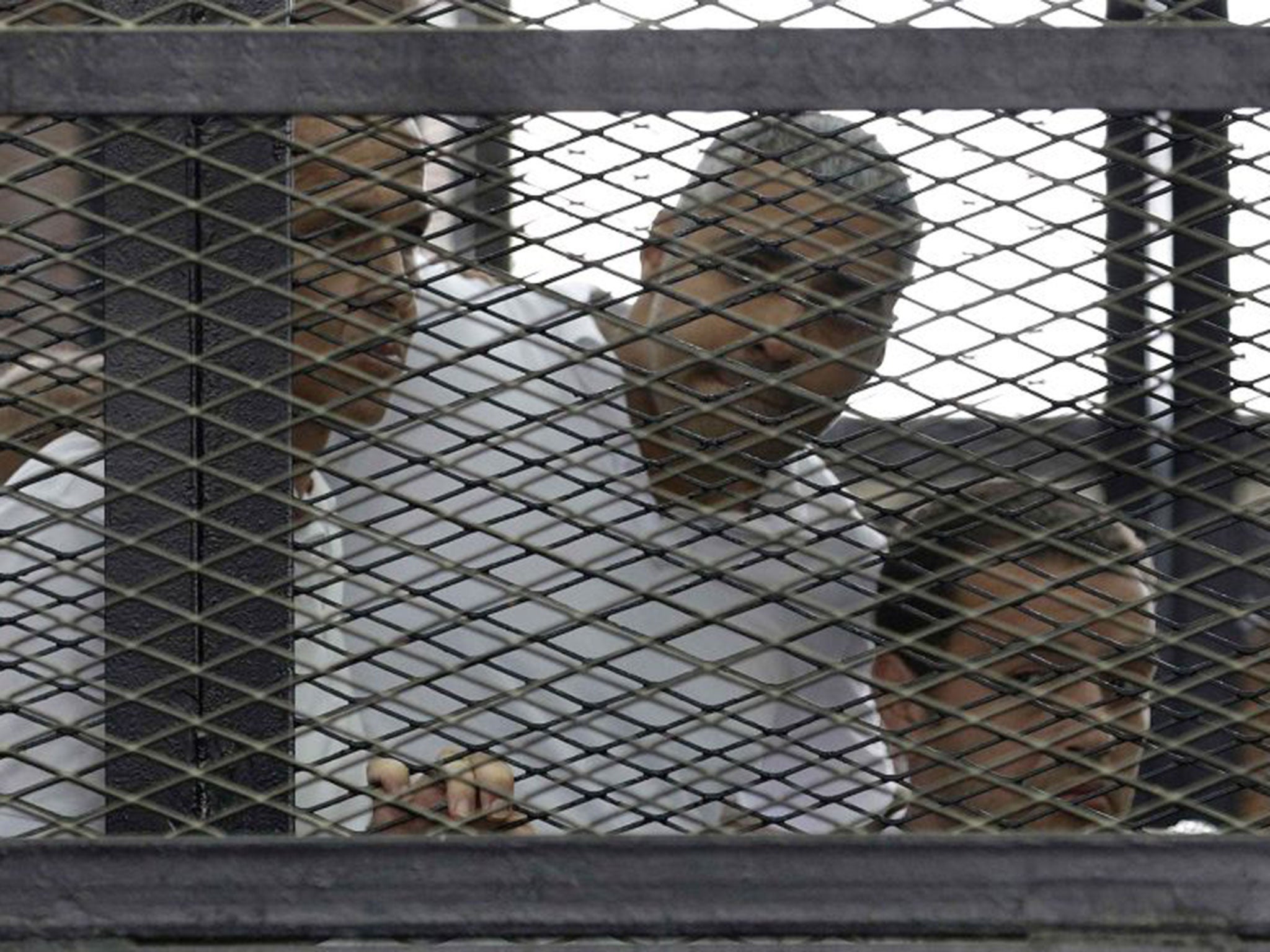Al-Jazeera journalists jailed: Chorus of international condemnation for Egypt trial - 'This isn’t a system, everything is corrupt'
They expected to walk free. Instead Al Jazeera reporters were sentenced to up to 10 years in prison for ‘falsifying news reports’ in support of the Muslim Brotherhood. Tom Dale reports from Cairo on a case which has sparked global condemnation

Your support helps us to tell the story
From reproductive rights to climate change to Big Tech, The Independent is on the ground when the story is developing. Whether it's investigating the financials of Elon Musk's pro-Trump PAC or producing our latest documentary, 'The A Word', which shines a light on the American women fighting for reproductive rights, we know how important it is to parse out the facts from the messaging.
At such a critical moment in US history, we need reporters on the ground. Your donation allows us to keep sending journalists to speak to both sides of the story.
The Independent is trusted by Americans across the entire political spectrum. And unlike many other quality news outlets, we choose not to lock Americans out of our reporting and analysis with paywalls. We believe quality journalism should be available to everyone, paid for by those who can afford it.
Your support makes all the difference.Egypt’s jailing of a group of Al Jazeera journalists on Monday was described as chilling and draconian by US Secretary of state John Kerry in a chorus of international condemnation.
British Foreign Secretary William Hague said he was appalled at the guilty verdicts handed down in Cairo after “unacceptable procedural shortcomings” in their prosecution process.
Baher Mohamed from Egypt and Britons Sue Turton and Dominic Kane were sentenced to 10 years for aiding a terrorist organisation (Mohamed’s sentence included three years for possession of a spent ammunition round), while Australian Peter Greste and Egyptian Mohamed Fahmy were sentenced to seven years. Thirteen others received sentences of 10 years.
Fahmy was dragged from the caged dock after the verdict was handed down, while his fiancée, looking on, broke down in tears on the other side of the courtroom.
“They ruined families today,” said Fahmy’s brother Adel. “This isn’t a system. Everything is corrupted.”
The Al Jazeera English journalists were accused of fabricating misleading television reports which “portend the downfall of the state” in order to advance the agenda of the Muslim Brotherhood, which governed the country for a year until last July, but is now designated a terrorist organisation.
The other defendants in the dock included five students, and a man described in local press as being involved with an Islamic charity. They were accused of aiding Al Jazeera in its mission.
Turton and Kane were tried in absentia along with Dutch reporter Rena Netjes, who fled Egypt before she was identified by the authorities. The judge did not give any reasons for his verdicts.
The trial was marked by a series of irregular, even bizarre, developments but until the last moment the journalists seemed hopeful. Last week, Fahmy said that he was feeling confident that the defence case was strong.
At times, the judge seemed to warm to Fahmy, addressing him once using the Arabic endearment “habibi”.
The prosecution, meanwhile, introduced a variety of apparently irrelevant video material as evidence, including reports produced by Greste in Kenya, where he was based before his arrest. Miscellaneous footage of farm animals was also played, and an inaudible recording of the students.
In a crucial development on 1 June, technical experts commissioned by the court admitted that they could not say that the footage found in the team’s studio betrayed evidence of manipulation or misleading editing. They also said they did not speak English, the language of much of the footage.
Philip Luther, Middle East and North Africa Director at Amnesty International said the trial was a complete sham. “Consigning these men to years in prison after such a farcical spectacle is a travesty of justice,” he said.
“We’re very disappointed at this judgment,” said British ambassador James Watt, who attended the hearing. “From the start of this we’ve had serious concerns. Freedom of expression and freedom of the press is of fundamental importance to any democracy.”
The journalists have been in captivity since 29 December, when they were arrested during raids on their studio in central Cairo and Baher Mohammed’s home. Mr Fahmy has lost full use of his shoulder due to a lack of medical treatment in prison. The journalists are expected to appeal.
Andrew Greste said he looked into his brother’s eyes as he was lead away. “He’s not going to give up,” he said.
After the defendants were led from the dock, it was quickly filled again, with dozens of white-clad prisoners, in another mass trial of alleged opponents of the regime.
In a statement William Hague said: “I am particularly concerned by unacceptable procedural shortcomings during the trial process, including that key prosecution evidence was not made available to the defence team. Freedom of the press is a cornerstone of a stable and prosperous society.”
Join our commenting forum
Join thought-provoking conversations, follow other Independent readers and see their replies
Comments